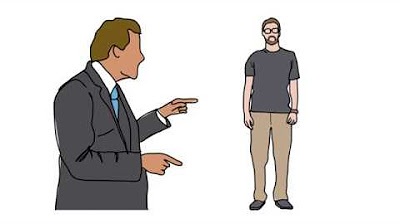Understanding Different Communication Styles: 4 Types of Communicators | TeamGantt
Summary
TLDRThis video explores four distinct communication styles commonly found in project teams, based on Mark Murphy's research: Analytical, Intuitive, Functional, and Personal. It outlines each style’s strengths and preferences, emphasizing how project leaders can tailor their communication to better connect with team members. Analytical communicators focus on facts and logic, Intuitive communicators prefer big-picture thinking, Functional communicators excel at detail and process, and Personal communicators thrive on building relationships. The video offers actionable tips for adapting communication strategies to each style, ultimately enhancing team collaboration and productivity.
Takeaways
- 😀 Understand that your team's communication styles may differ, and tailoring your approach to each one can improve the effectiveness of your messages.
- 😀 Analytical communicators prioritize facts and data over emotions. To communicate effectively with them, focus on clarity, precision, and well-supported arguments.
- 😀 Intuitive communicators focus on the big picture and value quick decision-making. Avoid overwhelming them with details and instead highlight overarching goals and opportunities.
- 😀 Functional communicators thrive on structure and details. Present information logically, with clear processes and timelines, to ensure they remain engaged and focused.
- 😀 Personal communicators value relationships and emotional connections. Build rapport by listening actively and using emotive language that resonates with their perspective.
- 😀 When communicating with analytical people, ensure your points are backed by data, and allow them time to consider and analyze the information you present.
- 😀 Intuitive communicators appreciate a variety of options and visual aids. Present ideas quickly and with enough room for them to think critically and act decisively.
- 😀 Functional communicators excel in organizing tasks and managing projects. Make sure your communication is well-structured, with clear tasks and deadlines.
- 😀 Personal communicators are sensitive to group dynamics and morale. Be patient and open to various viewpoints while guiding conversations toward concrete outcomes.
- 😀 To improve team communication, develop an awareness of these communication styles and adjust your approach to meet the needs of different team members.
- 😀 To deepen your understanding of communication styles and strategies, explore additional resources, such as the free online course 'The Art and Science of Leading Projects'.
Q & A
What is the primary goal of the project leader in communication?
-The primary goal of the project leader is to ensure that their message lands well with everyone on the team, regardless of their individual communication styles.
What are the four communication styles discussed in the video?
-The four communication styles discussed are Analytical, Intuitive, Functional, and Personal communicators.
How do Analytical communicators approach decision-making?
-Analytical communicators lead with facts and data, preferring logic and concrete information. They rely on these facts to make decisions and solve problems, often staying neutral and unemotional in their approach.
What should you focus on when communicating with Analytical communicators?
-When communicating with Analytical communicators, focus on providing clear, concise, and logical information backed by facts. Avoid emotional language and be prepared with data to support your points.
What makes Intuitive communicators unique in their approach to communication?
-Intuitive communicators prefer to see the big picture and make decisions quickly without getting bogged down in details. They focus on overarching ideas and opportunities, often challenging the status quo to drive innovation.
What is a potential risk when working with Intuitive communicators?
-The risk with Intuitive communicators is that they may overlook important details or skip necessary steps due to their focus on the bigger picture. Regular check-ins are necessary to ensure their work is on track.
How should you communicate with Functional communicators?
-To communicate effectively with Functional communicators, focus on presenting clear, structured information, outlining tasks with specific timelines, and making connections to a well-defined process or plan.
What challenges might arise when working with Functional communicators?
-Functional communicators may get too caught up in the details, which could overwhelm or disengage their audience. It's important to maintain clarity and focus on the process without losing sight of the bigger goals.
What is the role of Personal communicators in a team?
-Personal communicators excel at building relationships and understanding team dynamics. They are natural at sensing when team morale is low and can resolve conflicts due to their emphasis on maintaining strong personal connections.
How can you improve your relationship with Personal communicators?
-To improve your relationship with Personal communicators, be authentic, listen actively, and show genuine interest in their perspectives. Use emotive language to connect emotionally, but be patient as they consider everyone’s viewpoint.
Outlines

このセクションは有料ユーザー限定です。 アクセスするには、アップグレードをお願いします。
今すぐアップグレードMindmap

このセクションは有料ユーザー限定です。 アクセスするには、アップグレードをお願いします。
今すぐアップグレードKeywords

このセクションは有料ユーザー限定です。 アクセスするには、アップグレードをお願いします。
今すぐアップグレードHighlights

このセクションは有料ユーザー限定です。 アクセスするには、アップグレードをお願いします。
今すぐアップグレードTranscripts

このセクションは有料ユーザー限定です。 アクセスするには、アップグレードをお願いします。
今すぐアップグレード関連動画をさらに表示

4 Styles of Communication | Communication Styles In The Workplace

HERRMAN’S MODEL || WHOLE BRAIN THEORY

The Four Behavior Styles - Platinum Rule

Build don't break relationships with communication - connect the dots | Amy Scott | TEDxQueenstown

KUIS GAYA PEMIKIRAN | TERMASUK GAYA PEMIKIRAN MANAKAH ANDA??

Autodesk Build Demo: Construction Document Management
5.0 / 5 (0 votes)
